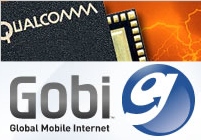CTIA: Qualcomm updates Gobi roadmap
Embedded chips to dominate mobile broadband product development in the coming year.

Embedded chips are set to replace USB dongles and data cards as the main way for business users to connect their laptops to mobile internet services, according to wireless technology company Qualcomm.
At CTIA this week in Las Vegas, Qualcomm announced that its Gobi chips have been certified by T-Mobile for use on its network. Gobi has already been qualified by US operator Verizon and Qualcomm expects Vodafone to approve the chip soon.
Unlike most embedded wireless WAN modules or data cards, Gobi chips are dual mode and will work on either CDMA or GSM/UMTS based networks. Currently Gobi supports both high-speed packet access, for GSM, and EV-DO for CDMA services. The chipset also provides native GPS support, for navigation and other location-based applications.
According to Sanjay Jha, chief operating officer for Qualcomm CDMA Technologies, the market for laptops with embedded wireless chips could be as large as 100 million units a year, driven largely by the demands of business users.
"There is a need for enterprise users to stay connected with both vertical and horizontal applications, so they can use them outside work and deliver value back to the enterprise," he said. "30 per cent of enterprise users are classified as mobile professionals who can justify $50 to $60 a month [for wireless data access] and easily deliver better value than that in terms of the work they are able to do whilst they are mobile."
Qualcomm is working with the majority of leading laptop manufacturers, including HP, Panasonic, Acer and Dell to include Gobi-based cellular modules. The cellular modules themselves are being provided to OEMs by Sierra Wireless, Novatel and Option.
In most cases, Qualcomm expects device makers to ship Gobi-equipped laptops without any network locks, allowing users or IT departments to choose or switch between cellular operators. Gobi also supports sessional access, either via a token or credit card, so that users can order a laptop without the need to also take out a cellular data plan.
Get the ITPro daily newsletter
Sign up today and you will receive a free copy of our Future Focus 2025 report - the leading guidance on AI, cybersecurity and other IT challenges as per 700+ senior executives
Frequent travellers could also use sessional plans to avoid data roaming charges, according to Beau Beck, director for business development at Qualcomm CDMA Technologies. The chip designer is working with Vodafone and Verizon to allow those operators' customers to roam between the two networks, even though Verizon uses EVDO and Vodafone, HSDPA. A multi-standard chip also allows businesses to standardise on one, single laptop model for global deployments, said Beck.
Analysts expect demand for laptops with embedded cellular chips to grow, especially as mobile operators roll out more flexible data plans. "Wi-Fi hotspots lack ubiquitous coverage for the mobile worker and make it difficult for many organisations to keep employees connected while travelling," said Carrie MacGillivray, senior research analyst at IDC. "Multi-mode cellular data access embedded in laptops offers increased flexibility and efficiency for mobile workers."
-
 Cleo attack victim list grows as Hertz confirms customer data stolen
Cleo attack victim list grows as Hertz confirms customer data stolenNews Hertz has confirmed it suffered a data breach as a result of the Cleo zero-day vulnerability in late 2024, with the car rental giant warning that customer data was stolen.
By Ross Kelly
-
 Lateral moves in tech: Why leaders should support employee mobility
Lateral moves in tech: Why leaders should support employee mobilityIn-depth Encouraging staff to switch roles can have long-term benefits for skills in the tech sector
By Keri Allan